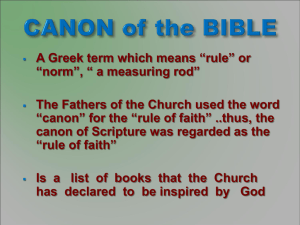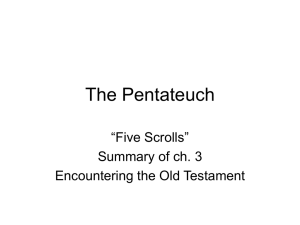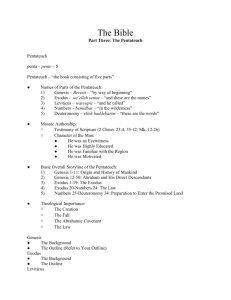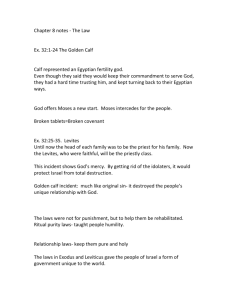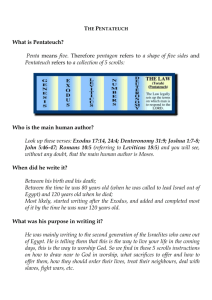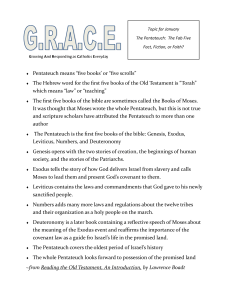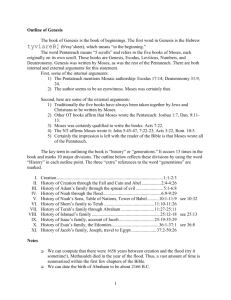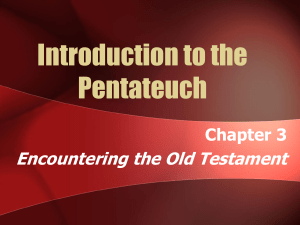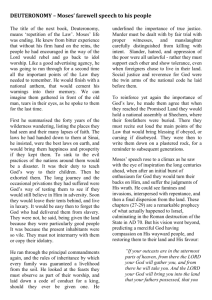equip bible study - West London Church Of God
advertisement
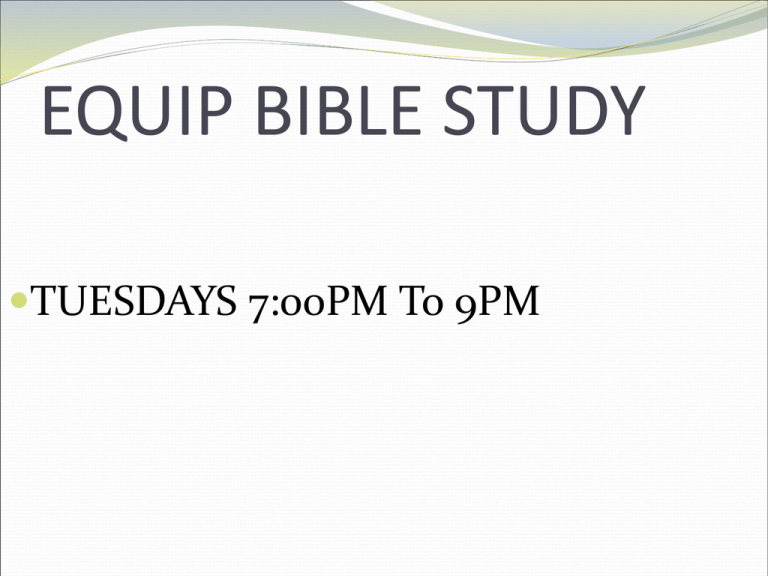
EQUIP BIBLE STUDY TUESDAYS 7:00PM To 9PM CHAPTER 2 OLD TESTAMENT SURVEY BIBLE Hebrew Bible is called TaNaK. Torah (Books of Moses) N'vi-im (Prophets) K'tuvim (Writings) - Law and Prophets ( Matt 7:12; Luke 16:16, 29, 31) - 3 fold division Law, the Prophets and the Writings (Luke 24:44). Greek Translation of the Old Testament is called Septuagint (LXX) Introduction to the Pentateuch The five books of Moses are variously know as the Law, the Torah (Hebrew for Law), the Law of Moses, the Pentateuch. The word “Pentateuch” is derived from the Greek words penta(five) and teuchos (scroll or book) Introduction to the Pentateuch (Continues...) These books shows a clear continuity of content, theme, purpose, and style that point to a single author. They make up a unity, not a late and unreliable patchwork. Each book smoothly picks up where the previous book left off. There is a completeness about the Pentateuch not only in its consecutive history but also in its progressive spiritual development. PENTATEUCH BOOK KEY IDEA GENESIS BEGINNINGS EXODUS REDEMPTION LEVITICUS WORSHIP/HOLINESS NUMBERS WANDERINGS DEUTERONOMY RENEWED COVENANT GENESIS Theme: Beginnings Date Written: 1450 – 1410 B.C. Author: Moses Setting: Middle East Genesis The Hebrew word for Genesis means “in the beginning.” and that is exactly what Genesis is all about. As the first book of the Bible, Genesis lays out the foundation for everything that is to follow, including key truths God wants you to know in order to make sense of your life. Purpose of Genesis Genesis was written to present the beginning of everything except God: the universe (1:1); man (1:27); the Sabbath (2:23); marriage (2:22-24); Sin (3:1-7); sacrifice and salvation (3:15, 21); the family (4: 1-15); Civilization (4:16-21); government (9:1-6); Nations (11); Israel (12:1-3). It was also written to record God’s choice of Israel and His covenant plan for the nation, so that the Israelites would have a spiritual perspective. SURVEY OF GENESIS THE FOUR GREAT EVENTS: Chapter s 1 – 11 1. Creation 2. Fall 3. Flood 4. Nations THE FOUR GREAT PEOPLE : Chapter 12 -50. 1. Abraham 2. Isaac 3. Jacob 4. Joseph Genesis A. 2000 or more years, 4000 – 2090 B.C. (Ch. 1 – 11) 1. Creation, 4000 B.C. Or earlier (1:1) 2. Death of Terah, 2090 B.C. (11:32) B. 193 years, 2090 – 1897 B.C. (Ch. 12-36) 1. Death of Terah, 2090 B.C. (11:32) 2. Joseph to Egypt, c. 1897 B.C. (37:2) C. 93 years, 1897-1804 B.C. (Ch. 37 – 50) 1. Joseph to Egypt, c. 1897 B.C. (37:2) 2. Death of Joseph, 1804 B.C. (50:26) Life Lessons from Genesis God, the unique and sovereign Creator, made you and knows you better than you know yourself. God created you in His image, as an expression of Himself. God uses people with feet of clay – the imperfect, the failures, the flawed –to accomplish His Will. God takes evil seriously, and those who reject His love and wisdom will experience His Judgment. God is well able to turn your tragedies into triumphs. EXODUS Theme: Redemption Date Written: 1450 – 1410 B.C. Author: Moses Setting: From Egypt to Mount Sinai Exodus The time that passes between the final verse of Genesis and the first verse of the book of Exodus is about 400 years. During those four centuries, the 70 members of Jacob’s family (who settled with Joseph in Egypt in order to survive a severe famine) multiply to over two million. SURVEY OF EXODUS REDEMPTION FROM EGYPT (Chapter 1-18). REVELATION FROM GOD (Chapters 19-40). Model of the Tabernacle Life Lessons from Exodus God hears the cries of His people and delivers them. Preparation for Spiritual leadership takes time. When God Selects you for a task, no excuses are acceptable. God demands your wholehearted, undivided worship. Praying for others is a vital element in your Christian life. Repentance restores your fellowship with God LEVITICUS Theme: Worship/Holiness Date Written: 1450 – 1410 B.C. Author: Moses Setting: Mount Sinai Leviticus By the time the book of Exodus ends, one year has gone by since God’s people left Egypt. During that year, two new developments have taken place in God’s dealings with His people. First, God’s glory is now residing among the Israelites; and second, a central place of worship– the tabernacle – now exists. As Leviticus opens, the Israelites are still camping at the base of Mount Sinai in the wilderness. Leviticus... Continues No geographical movement takes place in Leviticus: The children of Israel remain at the foot of Mount Sinai (Lev. 25: 1-2; 26:46; 27:34). The New Calender of Israel begins with the first Passover (Ex 12:2); and, according to Exodus 40:17, the tabernacle is completed exactly one year later. Leviticus picks up the story at this point and takes place in the first month of the second year. Numbers 1:1 opens at the beginning of the second month. Leviticus .... Continues Throughout this book there is continual instruction regarding dedication to personal holiness in response to the holiness of God. This emphasis is repeated over 50 times through the phrases “I am the Lord” and “I am holy”. FIVE OFFERINGS AND ITS MEANING The Burnt Offering – typifies Christ’s total offering in submission to His Father’s will. The Meal Offering - typifies Christ’s sinless service. The Peace Offering – is a type of the fellowship believers have with God through the work of the Cross. The Sin Offering – typifies Christ as guilt-bearer. The Trespass Offering – typifies Christ’s payment for the damage of sin. The Feasts of Israel The First Coming of Christ Month Day(s) Feast Looks Back on... Looks Ahead to... Scripture 1st 14 Passover Redemption of Christ’s Redeeming 1 Cor. 5:7 Death 1 Peter 1:18-19 1st 15-21 UnLeavened Bread Separation from Holy Walk of other Nations Believers 1 Cor. 5:7-8 Gal. 5:9, 16-17 1st 16 First fruits Harvest in the Land Resurrection of Christ Revelation 1:5 1 Cor. 15:20-23 3rd 6 Pentecost Completion of Harvest Sending of the Acts 2:1-47 Holy Spirit 1 Cor. 12:13 The Feasts of Israel The Second Coming of Christ Month Day(s) Feast Looks Back on... Looks Ahead to... Scripture 7th 1 Trumpets Israel’s New Year Israel’s Regathering Isaiah 27:12-13 Matthew 24:21-31 7th 10 Day of Atonement Israel’s National Sin Israel’s National Zechariah Conversion 12:10 Romans 11:26-27 7th 15-22 Tabernacle Israel in the Wilderness Israel in the Kingdom Zechariah 14:4-16 Revelation 7:9 - 17 SURVEY OF LEVITICUS Laws of Sacrifice (Chapters 1 – 17) Laws of Sanctification (Chapters 18 – 27) Life Lessons from Leviticus God is holy and demands holy living from His people God states there are acceptable and unacceptable ways to worship Him. God has exciting standards for living. God says obedience to His standards results in blessing, while disobedience is punished. NUMBERS Theme: Wanderings/Journeys Date Written: 1450 – 1410 B.C. Author: Moses Setting: The Wilderness How did this book get its name? It takes its name from the two numberings of the Israelites – the first at Mount Sinai and the second on the plains of Moab. The generation of Exodus (Numbers .1) and the generation that grew up in the wilderness and conquered Canaan (Numbers 26). WHAT IS NUMBERS ALL ABOUT? Numbers is the book of wanderings. Most of the book, however describes Israel’s experience as they wander in the wilderness. For Israel, an eleven-day journey became a forty-year agony. This book is also called “Book of Journeys ; and the Book of Murmurings. SURVEY OF NUMBERS THE OLD GENERATION (1:1 – 10:10) THE TRAGIC TRANSITION (10:11 – 25:18) THE NEW GENERATION (21 -36) Life Lessons from Numbers Order and discipline are essential for successfully completing your journey through life. Even when the odds are overwhelming, you can believe in God and His promises. Beware of the unbelief of others. It’s Contagious! Fearing others and failing to trust God has grievous consequences. Like Joshua and Caleb, don’t follow the unbelief of the majority. Instead, have faith in God and reap the blessings. DEUTERONOMY Theme: Renewed Covenant Date Written: 1410 B.C. Author: Moses Setting: The plains of Moab. What is Deuteronomy? Deuteronomy - (the second law), or Repetition of the Law. Deuteronomy is an adaptation and expansion of much of the original law given on Mount Sinai. Deuteronomy ... Continues The book of Deuteronomy takes place entirely in one location over a month of time. Israel encamped east of the Jordan River across from the walled city of Jericho. Deuteronomy concentrates on events that take place in the final weeks of Moses’ life. DEUTERONOMY ....Continues It consists of a series of farewell messages by Israel’s 120 year old Leader (Moses). It is addressed to the new generation destined to possess the Land of Promise. Purpose: “Beware lest you forget” SURVEY OF DEUTERONOMY MOSES’ FIRST SERMON (CH. 1 to 4:43) - What God has done MOSES’ SECOND SERMON (CH. 4:44 – 26:19) - What God Expected of Israel MOSES’ THIRD SERMON (CH. 27 – 34) -What God will Do Life Lessons from Deuteronomy Let your past failures prepare you for future victories. Realize God can blot out any sin, but He does not always take away it consequence. Never forget what you were saved from. Review God’s Word regularly – it will guide your steps.
